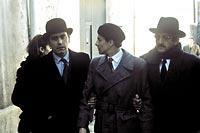"Army of Shadows": Resistance thriller enhanced by insider's memories

A casual viewing of Jean-Pierre Melville's "Army of Shadows" might lead one to conclude it's the least thrilling of thrillers, especially if you're using action director John Woo as your yardstick. Closer attention to Melville's semi-autobiographical chronicle of French Resistance fighters during World War II reveals it to be as close to a masterpiece as any film you're likely to see this year.
Released in 1969 and never before shown in the U.S., this aptly titled, breathtakingly authentic film marks the latest entry in what has become a celebrated campaign to rescue Melville from relative obscurity, as the great director's outstanding but little-seen classics ("Bob le Flambeur," "Le Samouraï," "Le Cercle Rouge") have been successively unveiled as pristine restorations prior to DVD release. Of all of these, "Army of Shadows" may be the most startling discovery; imagine if Sam Peckinpah's "The Wild Bunch" (released the same year) had gone unseen in France for 37 years and you'll grasp the magnitude of this occasion.
"Army of Shadows," with Lino Ventura, Simone Signoret, Paul Meurisse. Written and directed by Jean-Pierre Melville, based on the novel by Joseph Kessel. 145 minutes. In French with English subtitles. Not rated; contains violence. Harvard Exit.
Drawing from his own experience, Melville had made two previous Resistance films. But in Joseph Kessel's definitive 1943 Resistance novel, he found the key to distilling the movement to its physical and psychological essence: Kessel's freedom fighters are not only shadows themselves, defying Nazi occupation as specters in the night, but they occupy murky zones of cautious trust and surgical precision, coldly prepared to eliminate comrades who threaten their tenuous security.
"Army of Shadows" is similarly without compromise, lulling you into its calmer interludes before jolting you with a reminder that every move can be fatal, every encounter a risk of exposure. Nobody knows this better than Gerbier (Lino Ventura, a coiled cobra, ready to strike), a devoted Resistance agent who, as the film opens, escapes from Gestapo custody to rejoin a Resistance network. It's led by philosopher Luc Jardie (Paul Meurisse) and includes fellow shadow-dwellers Mathilde (Simone Signoret) and Jean-François Jardie (Jean-Pierre Cassel), who's yet to discover that his brother leads their cause.
Revelations like that, and scenes like the one in which Gerbier visits a barber and quietly discovers a comrade through subtle expressions and gestures, make "Army of Shadows" a film of constant surprise and simmering suspense. You can feel throughout that Melville knew people like this, and was one himself, keenly aware of every detail (as implied by the film's opening quotation) from unhappy memories of his distant youth in the Resistance.
Befitting a story of such clandestine fatalism, "Army of Shadows" may be one of the darkest films ever made — and how could it be otherwise? It draws light not from the sun but from the elusive hope of a cause fought against all odds.
Jeff Shannon: j.sh@verizon.net